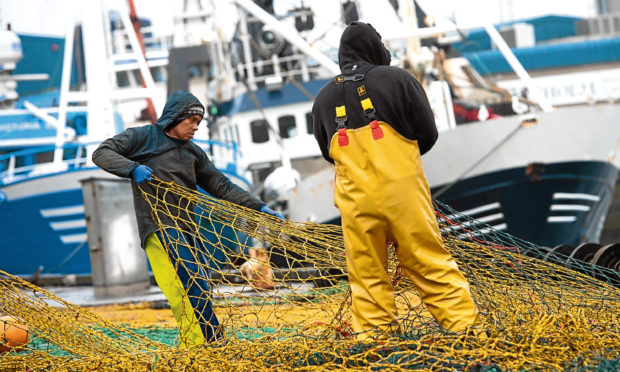Scottish fishing chiefs spelled out their demands for Brexit last night as pressure ramps up on Prime Mininster Theresa May not to cede any sovereignty over fishing policy to Brussels.
Bertie Armstrong, chief executive of the Scottish Fishermen’s Federation (SFF), said the message “could not be clearer”.
He added: “Full control of UK fishing grounds means restoring sovereignty over all aspects of the industry to this country, with no third country able to dictate the rules on access, quota, management measures or anything else.”
An independent UK outside the EU could be “as generous or ungenerous” as it wanted in terms of negotiating quotas and access rights with international partners, he added.
The UK will leave the much despised Common Fisheries Policy (CFP) at the point of Brexit, although some media reports of a recent joint statement by Scottish Tory leader Ruth Davidson and UK Environment Secretary Michael Gove suggested one could happen without the other.
Mr Armstrong said: “Leaving the Common Fisheries Policy, which enshrines EU common access to our waters and awards 60% of our seafood resource to others will happen … and is the absolute first step towards regaining control.
“The legal position is then very straightforward; outside the CFP, the UK becomes responsible for managing its own waters or exclusive economic zone, and does so as a wholly sovereign, independent coastal state like Norway, Iceland and Faroe.
“It is fundamentally important that this sovereignty is not diluted or postponed, allowing us to be as generous, or otherwise, as negotiations require.”
He added: “A well-established set of annual international negotiations already exist for coastal states to agree access to outside fleets for set amounts of quota, and the UK will participate in these.
“But the critical aspect of this will be that the UK will be in total control of which vessels it allows into its waters and for what amounts of which stocks.
“The benefits of moving to this much more equitable position are clear – a boost to our coastal communities from new jobs, investment and expansion of the sector.”
Mr Armstrong also pointed out that talks taking place in Brussels later this year will set the catch rules for all EU fisheries, including the UK’s, for 2018.
After Brexit in March 2019, the UK will have about nine months to prepare for life as an independent coastal state.
What happens during this spell is currently uncertain but Mr Armstrong said he was comfortable with the idea of arrangements agreed while the UK is still in the EU to apply until Britain takes its own seat at coastal state talks in late 2019, as long as “life does not get any worse” for the home fleet.
But there is some dissent within the ranks of UK fishers, with fringe group Fishing for Leave (FfL) warning that a nine-month transitional “bridge” could give Brussels the upper hand in future negotiations.
Draft guidelines for the EU side of Brexit trade talks reportedly seek “existing reciprocal access to fishing waters”, and FfL fears any continuation of CFP-like circumstances after Brexit could be a dangerous precedent.
FfL campaigner Aaron Woods said: “If it walks like the CFP and quacks like the CFP, it is the CFP.”
Despite FfL welcoming the recent intervention of Ms Davidson and Mr Gove, the group has called for “more clarity” from Tory politicians and urged them to “stop playing semantics”.
